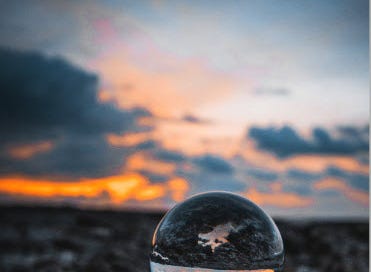No Place to Hide From Climate
Can we fix Earth's climate with the help of species that have been here much longer?
IN 2018 I CAME TO AN EPIPHANY. Climate change was going to continue to disrupt the lives of all creatures here on planet blue and green. Something had to be done.
I had just moved because my Northern California county kept having big fires destroying tens of thousands of acres of wildland forest and brush at a time. The smoke settling over California’s largest natural lake, Clear Lake, was a gray, acrid cloud that lasted for weeks. Mountains were rimmed at night by an orange fire that cast an ominous, hellish glow. Ash from burned trees was falling on the deck every time there was a fire within 30 miles.
One fire was so close that my family got an early morning pounding on the door by a sheriff telling us to evacuate NOW. As we left clutching a few valuables, the air outside was so choked with smoke we couldn’t see more than a dozen feet. We found ourselves in a traffic jam of people trying to evacuate in the dim, eerie light.
The house survived, but after two evacuations, we decided to move. More and more Californians and Western state residents have these types of “fire stories” now. I’ve heard dozens of them.
It’s deeply unsettling to live with repeated threats to home and life. My husband and I became “climate refugees” as we looked for a safer place to live. We moved to the coast. Then, in 2020, even the coast was hit with fires, although not close enough to threaten our home.
There is no place to hide from climate disruption. The threat to your state or community might not be fire, but flooding, fierce hurricanes, throbbing heatwaves, or lost crops. Mother Earth has a fever and is unsettled.
So, what can we do?
The question to ask might be better phrased as “Who can we BE?” to change quickly enough to survive these times. It’s clear that the problems Earth is having are man-made. The solutions need to also come from us, with a helping hand from nature.
I started Mother E to explore nature's solutions. Not the solutions we already know about, such as moving to electric cars, green tech, and reducing CO2. Those are helpful, but not enough.
We also need to explore biological and natural solutions. We need to draw upon the intelligence of Earth, which has a 3.8 billion-year head start on creating sustainable life before we humans arrived.
Here’s an eye-opening geological lifetime calendar I found on Biomimicry 3.8 site. The whole of Earth's 4.5 billion-year existence is condensed into the scale of one calendar year, with Earth forming on January 1 and today being midnight of Dec. 31. You can see what life forms emerged and when. Guess when we humans show up?
January- Earth forms
February 25- first life appears
March 28- photosynthesis begins
August 16- multi-celled organisms
September 17- sexual reproduction
November- fungi, fish, land plants, insects
December 2- amphibians
December 6- reptiles
December 13- mammals
December 18- birds
December 25- dinosaur extinction
December 31 at 24 minutes before midnight- Primitive Homo sapiens arrive. And all of human history since the last Ice age started only 82 seconds before midnight.
We're one of the newcomers to show up on Earth. Plants and trees, called “our elder brothers” by indigenous peoples, came long before us. Reptiles and mammals came later, but still long before us. Our human talents are many, but our longevity will be determined by how we act and live while on this earth. Author/philosopher Charles Eisenstein worries that if we continue to destroy the “organs and tissues” of the earth, we will irreparably harm them and ourselves.
Our lives depend upon this generous planet which provides us with food, materials for shelter, clean water, and air. As is often pointed out, we have no “planet B” if we use up this one.
Let’s look together at the solutions we need to make a long life for all of Earth’s beings, including us. Fortunately, we have examples all around us. Earth has a possible 8 million other species who have adapted, evolved, and learned ways to co-exist sustainably on Earth for eons longer than we have been here. I will cover some of their remarkable stories on Mother E and look at ways we can be more in alignment with who we need to be to survive and thrive.
The knowledge is there, but a little Homo sapiens humility may be needed to discover it. Time is short. Let's do it.
“Somebody has to do something, and it’s just incredibly pathetic it has to be us.”
Jerry Garcia, musician, the Grateful Dead band



